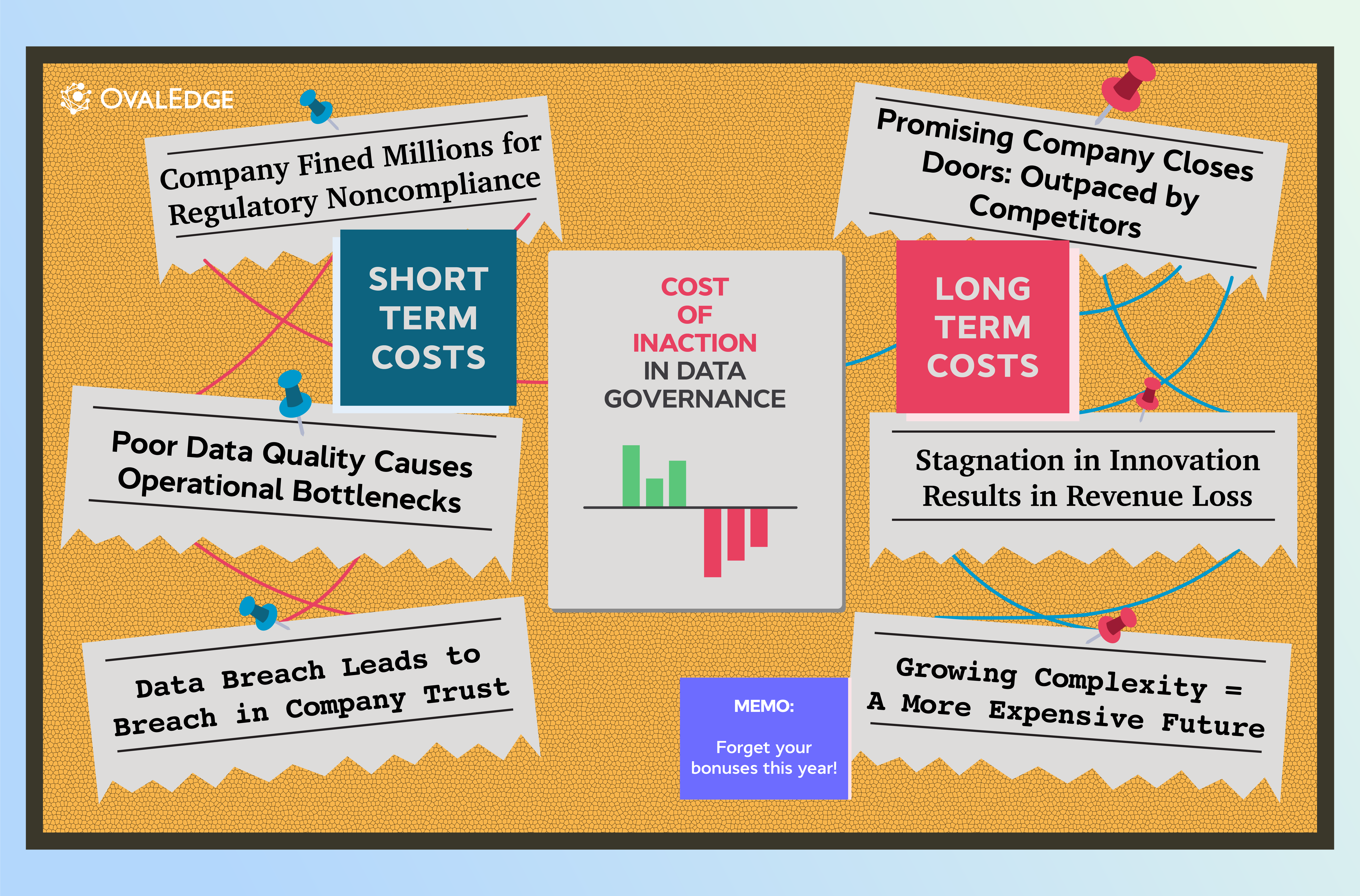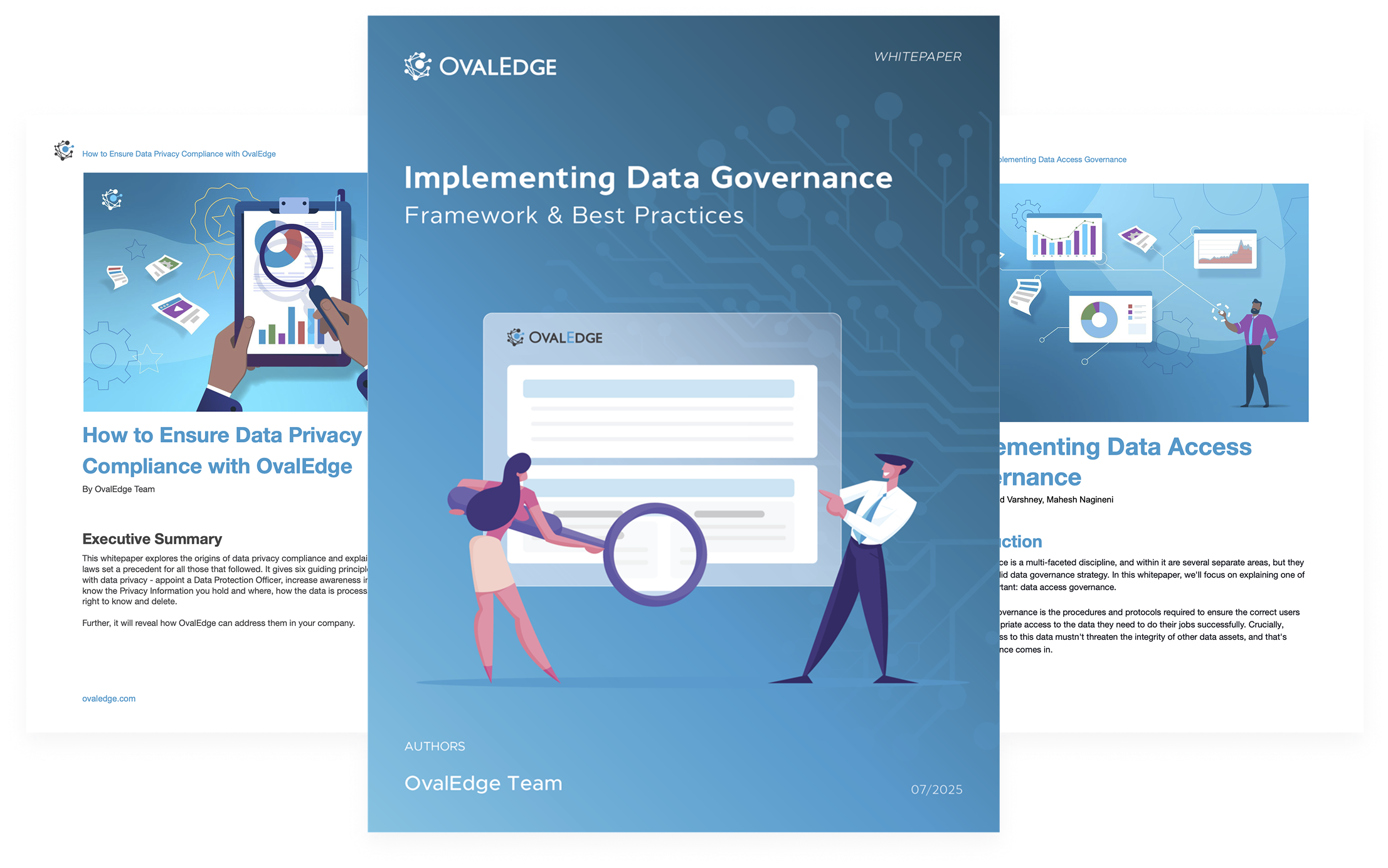Table of Contents

Data Governance : Cost of Inaction
Some business decisions—like implementing an ERP system—will boost productivity, but the worst that will happen if you fail to act on them is losing your competitive advantage. Others—like rolling out a data governance strategy—are critical, and neglecting them could see your company fail altogether.
We want to start this blog by asking you two questions: do you recognize the value of data to your organization? And do you have a strategy in place to govern it? We’ll take a guess that most of the people reading this blog will answer ‘yes’ to the first question, but for question two, many readers will answer ‘no.’ And that’s a huge problem, because data governance is urgent.
Lots of companies delay the implementation of a formal data governance initiative because of concerns about cost, but when you consider the cost of not having data governance in place, the money spent on preventing a data disaster is negligible. Let’s put that into context.
An enterprise with about 25 data users could spend under $20,000 a year to implement data governance in its network. As well as providing essential security, the measures would increase data-driven innovation and reduce costs in the data department. Compare this with the $4.45 million average global cost of a data breach, and you begin to understand the gravity of not investing in data governance.
We liken it to a ticking time bomb. When your data isn’t protected through stringent governance policies, it will lead to a catastrophic event like a data breach, compliance penalty, or misguided business decision. Like a ticking time bomb, you never know when this catastrophe is going to happen. In this blog, we’ll explain the short-term and long-term costs of failing to implement data governance with a series of examples to show the real-world consequences.
Related Post: Building an Effective Data Governance Framework
Short-Term Costs
When the bomb finally blasts, the initial fallout is severe. Of course, the damage to a company depends on the number of people the incident affects, the timing of the event, and the type of data that is involved, but in every scenario, the cost to businesses is great.
Inefficient decision-making
Without proper data governance, decision-makers rely on fragmented or unreliable data, affecting both the speed and quality of decisions. In the end, this impacts the most important driver of success in modern business: productivity.
Example: In May 2022, Unity, the company behind the world’s leading real-time 3D content development platform, lost 37% of the value of its stock price after ingesting bad data. The data skewed the company’s ad targeting and monetization algorithm, hindering growth and forcing the Unity team to go back and fix the issue at great cost.
Operational bottlenecks
Poor data quality and inconsistent data formats can lead to delays, affecting services like customer support, sales, and marketing outreach. Beyond this, the absence of data governance can lead to major errors that can stop regular business processes in their tracks.
Example: In October 2020, Public Health England (PHE) failed to report 16,000 positive Covid-19 cases after uploading the data into an outdated file format.
Regulatory fines
Companies without data governance are at higher risk of non-compliance, which can result in hefty fines even in the short term. Companies in every sector are subject to compliance regulations, such as the GDPR for data privacy, HIPAA in the healthcare industry, and the Sarbanes–Oxley Act for public companies.
Example: British Airways was fined £183 million by the UK’s ICO due to a data breach that could have been mitigated with effective data governance.
Ready to safeguard your business and boost trust with data privacy compliance? Read our blog on data privacy and compliance
Reputation damage
When you have a data leak or inadvertently reveal PII or other sensitive information, you erode trust in your brand. As a direct result, your customers will look elsewhere.
Example: In 2019, the Capital One banking group suffered a major data breach. As a result, the company saw a 6% drop in its share price and was forced to pay out an estimated $100-150 million in recovery and legal costs.
Higher audit and litigation costs
Poor data management can result in a higher risk of lawsuits and make internal audits cumbersome and expensive.
Example: After the notorious data breach at the credit reporting agency Equifax, the company was forced to pay hundreds of millions of dollars in restitution. Of the final sum, $77 million was awarded to the plaintiff’s lawyers.
Long-Term Costs
While the short-term costs of failing to implement data governance are significant, the long-term fallout can cripple a business.
Loss of competitive edge
Companies that lag in data governance will be overtaken by competitors who can make faster, more informed decisions. Beyond this, if the consequences of a data breach or other related incident are too severe, a company may fail altogether and be removed from the market.
Example: In September 2023, KNP Logistics Group, one of the largest privately owned logistics firms in the UK, was forced to close due to the business impact of a ransomware attack. Data governance helps organizations avoid the threat of ransomware attacks by ensuring data is constantly monitored, backups initiated, and secure access is in place.
Related Post: How the insurance industry leverages data governance for competitive edge
Stagnation in innovation
A lack of data governance affects your ability to leverage data for innovation, which in turn impacts product development and market position. When you are hit by a data breach, so much of your time and revenue is dedicated to fixing the problem, that innovation is stifled.
Example: In 2019, Equifax’s annual revenue was $3.5 billion. In the same year, the company was forced to pay $600 million in restitution, the equivalent of 17% of revenue for 2019.
Growing complexity
As your data ecosystem grows, retroactively implementing data governance will become increasingly complex and expensive.
Example: Yahoo’s data breach involving 3 billion accounts had a long-lasting impact on its valuation and brand image, costing it hundreds of millions in settlement fees and lost revenue.
How To Implement Data Governance Today
If you don’t have a data governance solution in place, you need to start the process now. The following steps will enable you to quickly find and implement a solution that will protect your data, protect your customers, and give your company the competitive edge.
- Analyze the best fit with our Data Governance Platform Comparison Guide.
- Book a Demo to learn how OvalEdge can protect you against data risks.
- Increase your knowledge of everything related to data governance with our free Academy.
Deep-dive whitepapers on modern data governance and agentic analytics

OvalEdge Recognized as a Leader in Data Governance Solutions
.png?width=1081&height=173&name=Forrester%201%20(1).png)
“Reference customers have repeatedly mentioned the great customer service they receive along with the support for their custom requirements, facilitating time to value. OvalEdge fits well with organizations prioritizing business user empowerment within their data governance strategy.”
.png?width=1081&height=241&name=KC%20-%20Logo%201%20(1).png)
“Reference customers have repeatedly mentioned the great customer service they receive along with the support for their custom requirements, facilitating time to value. OvalEdge fits well with organizations prioritizing business user empowerment within their data governance strategy.”
Gartner, Magic Quadrant for Data and Analytics Governance Platforms, January 2025
Gartner does not endorse any vendor, product or service depicted in its research publications, and does not advise technology users to select only those vendors with the highest ratings or other designation. Gartner research publications consist of the opinions of Gartner’s research organization and should not be construed as statements of fact. Gartner disclaims all warranties, expressed or implied, with respect to this research, including any warranties of merchantability or fitness for a particular purpose.
GARTNER and MAGIC QUADRANT are registered trademarks of Gartner, Inc. and/or its affiliates in the U.S. and internationally and are used herein with permission. All rights reserved.


